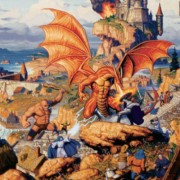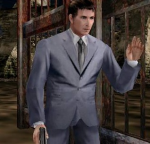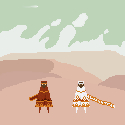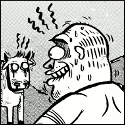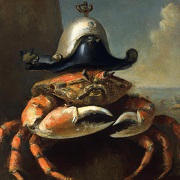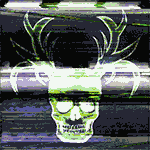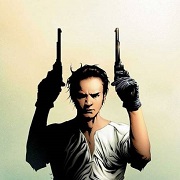|
Casimir Radon posted:A lot of hardcovers still use sewn spine. And even the glued ones seem a lot better nowadays (or I got more careful) than 10 years ago. Hadn't had any lose pages in years, even with glued ones.
|
|
|
|

|
| # ? May 24, 2024 08:17 |
|
Edit wrong thread
art of spoonbending fucked around with this message at 05:04 on Jan 4, 2014 |
|
|
|
A question for the English Lit people. Lately I've been trying to decipher the last paragraph of Thoreau's Walden. Thoreau posted:I do not say that John or Jonathan will realize all this; but such is the character of that morrow which mere lapses of time can never make to dawn. The light which puts out our eyes is darkness to us. Only that day dawns to which we are awake. There is more day to dawn. The sun is but a morning star. From doing some research online I discovered that (supposedly): "John or Johnathan" refers to Britain and American respectively. "The light that puts out our eyes in darkness to us" is inspired by Indian fakirs who would destroy their eyes by staring into the sun as an act of religious sacrifice, which I gather Thoreau judged to be misguided. If this is the case, the rest of the paragraph is commenting on religion. If so, what does the last line say? The sun (which represents fanatic religion) is also the thing that creates a dawn? I'm not a student of literature, forgive my tenuous grasp of this. Also, is there another meaning in this besides the religious stuff? Thanks.
|
|
|
|
Tenacious J posted:A question for the English Lit people. Maybe it's literal, saying that the sun which represents fanatic religion, is truthfully nothing more than the morning star.
|
|
|
|
WASDF posted:Maybe it's literal, saying that the sun which represents fanatic religion, is truthfully nothing more than the morning star. I suspect he would have written "the sun is but a star" then. Talking so much about the dawn and then tossing in the word morning seems too deliberate to be literal, maybe.
|
|
|
|
The sun is but a morning star, as in there is more to the day than the morning. Fits in with the rest of the paragraph's desire for transcendence.
|
|
|
|
What is the Writing Device called where characters in a story have no idea what things most people actually know about appear before them? IE main characters not knowing about werewolves, zombies and other creatures of myth and pop culture we all know about. I don't think it is a type of irony but more of a device used by authors to allow for unknown situations. Like how a character checks out a zombie that is laying on the floor with no head wound and has no idea what "this monster" could be.
|
|
|
|
That's dramatic irony, where "the audience’s or reader’s knowledge of events or individuals surpasses that of the characters." e: I should say that described situation would fit the term to a t, to my mind. Mr. Squishy fucked around with this message at 01:47 on Jan 8, 2014 |
|
|
|
Mr. Squishy posted:That's dramatic irony, where "the audience’s or reader’s knowledge of events or individuals surpasses that of the characters." I want to say that is it but it is not what I am trying to remember. The difference is in the world building of the story itself where a author makes a world an exact copy of our own but removes information of such well known things which in turn are what the characters are dealing with. Where as with Dramatic Irony I thought the definition was more isolated to Hitchcock themes where the author is giving us the information the character doesn't know like how there is a bomb ticking down in a room and the suspense builds from that knowledge. The character in that situation did not see the bomb but the audience did. What I am trying to say is there is a difference between a character not knowing something that we know because we were told and not knowing 1+1=2. Edit: Finally found it. The term is Genre Blindness but I swear there was a better more refined name for it. Drinkfist fucked around with this message at 02:05 on Jan 8, 2014 |
|
|
|
Drinkfist posted:I want to say that is it but it is not what I am trying to remember. I thought it might be like this. I'm coming up empty for anything more specific though, sorry. quote:Where as with Dramatic Irony I thought the definition was more isolated to Hitchcock themes where the author is giving us the information the character doesn't know like how there is a bomb ticking down in a room and the suspense builds from that knowledge. The character in that situation did not see the bomb but the audience did. You can use it more broadly than this. My glossary gives the example of Greeks knowing the ending to plays based on myth, which is pretty close to someone not knowing what a zombie is.
|
|
|
|
Over the Christmas holiday I went back and reread all the Vlad Taltos books for the first time since high school (and got caught up on the ones that came out since I'd last checked in) and I realized that they're pretty much perfectly calibrated for my maximum enjoyment. I was hoping someone could give me a recommendation for something similar? A friend recommended the Dresden Files but I've read those before and they're not my cup of tea at all.
|
|
|
|
bigstupidjellyfish posted:Over the Christmas holiday I went back and reread all the Vlad Taltos books for the first time since high school (and got caught up on the ones that came out since I'd last checked in) and I realized that they're pretty much perfectly calibrated for my maximum enjoyment. I was hoping someone could give me a recommendation for something similar? A friend recommended the Dresden Files but I've read those before and they're not my cup of tea at all. I promise you that the City Watch series of Discworld books will give you the same vibe. Start with Guards, Guards and move on through Men at Arms, Feet of Clay, Jingo, The Fifth Elephant, Night Watch, Thud and Snuff. Sam Vimes is a complex character who changes throughout the series just like Vlad. And they're incredibly funny.
|
|
|
Tenacious J posted:A question for the English Lit people. Ok, my brief and uninformed analysis of this is that the key sentence is "Only that day dawns to which we are awake." The idea is that there are good and beautiful things beyond our comprehension, but that still exist and are still beautiful, and (perhaps? possibly? potentially?) that by expanding our comprehension we can expand the range of good options which will open before us. In the context of Walden as a whole this probably means things like (for example) living out in nature is pretty awesome but most people aren't going to realize how awesome it is because they'll never know to go check out a wilderness pond in the early dawn. It's not just that they don't know how awesome Walden Pond is, it's that they don't even know that they don't know how awesome Walden Pond is -- they're blind to their own blindness. Expanding our horizons expands the range and breadth and depth of our joys. I haven't looked at the passage in context, just the snippet you quoted, but based on the quote I'd be hesitant to read too much literality into it -- saying that Johnathan is "Americans" rather than just "typical people," or that the passage is referring to religious experience specifically rather than the nature of experience generally.
|
|
|
|
|
Hieronymous Alloy posted:Ok, my brief and uninformed analysis of this is that the key sentence is "Only that day dawns to which we are awake." The idea is that there are good and beautiful things beyond our comprehension, but that still exist and are still beautiful, and (perhaps? possibly? potentially?) that by expanding our comprehension we can expand the range of good options which will open before us. In the context of Walden as a whole this probably means things like (for example) living out in nature is pretty awesome but most people aren't going to realize how awesome it is because they'll never know to go check out a wilderness pond in the early dawn. It's not just that they don't know how awesome Walden Pond is, it's that they don't even know that they don't know how awesome Walden Pond is -- they're blind to their own blindness. Expanding our horizons expands the range and breadth and depth of our joys. Thank you for the thoughts. I agree with you and think that this sentiment is what Thoreau was trying to hit although it doesn't preclude the religious stuff. It could have a dual meaning. I know for sure that he was trying to tap into transcendentalism at that point in the book, so, at least, there is bound to be something rich beneath the words.
|
|
|
|
In the context of old books (circa 1799), what does 'plate' mean? Am I right in thinking that it's an engraving print that would have come with the book when it was first sold, but could be easily removed and resold separately?
|
|
|
|
Jumpingmanjim posted:In the context of old books (circa 1799), what does 'plate' mean? Am I right in thinking that it's an engraving print that would have come with the book when it was first sold, but could be easily removed and resold separately? http://en.wikipedia.org/wiki/Tipped-in_page Example from a 1931 book of Rembrandt drawings I had lying around:   In case it's unclear, the drawing itself is printed separately and glued into the dotted rectangle which was printed on the page.
|
|
|
|
Carthag posted:http://en.wikipedia.org/wiki/Tipped-in_page Thank you!
|
|
|
|
Bought a copy of Dorothy Parker's 'Complete Stories' and it arrived from Amazon a few days ago, when reading I noticed it felt rather different to a normal Penguin Classics and on looking at the back found it was American. Is there anywhere I can go to read about the differences between printing? The American and British books react quite differently, for instance the British one closes unless you hold it open but when you place it flat everything will be flat where the American book seems to have a perpetual curve of the cover. (Here's a video, just in case my description doesn't describe the differences accurately; https://www.youtube.com/watch?v=phQsY7L8xQU )
|
|
|
|
You'd think this would be easier to google. Basically yeah the difference is massive and comes down to the sort of glue they use and so on. I have a relative who worked in publishing, I'll ask them to put that more definitely.
|
|
|
|
So I dunno if there's any history to this subject, or if this is a question that's been asked a billion times, but have there ever been any threads about House of Leaves here in The Book Barn? I have archives and I'd love to dive into any goon thoughts of the past (or present!) about the book.
|
|
|
|
Mr. Squishy posted:You'd think this would be easier to google. Basically yeah the difference is massive and comes down to the sort of glue they use and so on. I have a relative who worked in publishing, I'll ask them to put that more definitely. Thanks, that'd be great. I googled it originally but all I got were Harry Potter book questions and one slightly interesting page about the differences between the UK edition of the Great Gatsby and the American, which while fascinating, didn't actually help with the original issue.
|
|
|
|
Has anyone bought books published by Dover Thrift Editions? Their books are very cheap, ranging from around $2 to $5 depending on if they are giant versions. I've read that the paper and binding is of poor quality. Would I only get about one sitting out of these books before they fall apart or is that an exaggeration?
|
|
|
|
Sphinx posted:Has anyone bought books published by Dover Thrift Editions? Their books are very cheap, ranging from around $2 to $5 depending on if they are giant versions. I've read that the paper and binding is of poor quality. Would I only get about one sitting out of these books before they fall apart or is that an exaggeration? I would say it depends on how big the book is, I think, and how liable you are you crease the spine, dog-ear pages, etc. It's true they're quite cheaply made, but I have some Dover Thrift editions of Marlowe's The Jew of Malta and his translation of Ovid's Elegies which are, at this point, about five years old and still going strong. (I'm pretty delicate with my books, but not obsessively so.) Another point to keep in mind is that if you're reading something that you want a lot of explanatory notes and editorial material for, a Dover edition is not going to have that. Likewise if you plan on making marginal notes yourself, be careful, as a sharp pen-tip will probably rip right through the page.
|
|
|
|
Sphinx posted:Has anyone bought books published by Dover Thrift Editions? Their books are very cheap, ranging from around $2 to $5 depending on if they are giant versions. I've read that the paper and binding is of poor quality. Would I only get about one sitting out of these books before they fall apart or is that an exaggeration? No, they're not that fragile, though they are low quality. If you're incredibly hard on your books, it could be an issue, but they are so thin that you have to really throw them around for that. The biggest issue with them is that the font is pretty small. The paper quality is sort of similar to a really thick or high quality newspaper, so it's definitely cheaper than most book paper, but then I still have some of my copies which managed to survive copious highlighting and annotating and being a teenager at them. I wouldn't necessarily recommend them for translated works as they can be a bit poor, but if you just want to read some books for cheap, they're not bad.
|
|
|
|
Sphinx posted:Has anyone bought books published by Dover Thrift Editions? Their books are very cheap, ranging from around $2 to $5 depending on if they are giant versions. I've read that the paper and binding is of poor quality. Would I only get about one sitting out of these books before they fall apart or is that an exaggeration? In my experience, you get what you pay for: the paper's cheap, there's no notes and usually barely an introduction, but if you don't mind those (or if it's translated, a translation that's in the public domain), they're fine. That said, if I'm going cheap, I usually go with a Wordsworth Editions. I think they're pretty good quality for the price and I like their covers better, too: just about every Dover book has a cover that looks like Victorian wallpaper.
|
|
|
|
barkingclam posted:In my experience, you get what you pay for: the paper's cheap, there's no notes and usually barely an introduction Do people actually read the introductions? Unless the book is nonfiction I can not believe anyone wanting to read several pages of some other dude go on and on about how great they think the book your about to read is.
|
|
|
|
Sometimes they have some interesting info about the book or its author that I would be too lazy to look up on my own. Also I usually read the introduction after I've finished the book and not before, since my memory is garbage it's useful for reminding me about things I may have forgotten by the end of a long book.
|
|
|
|
... Did my House of Leaves question just get completely, systemically ignored? 
|
|
|
|
DoctorWhat posted:... Did my House of Leaves question just get completely, systemically ignored? Everybody has you on ignore. Owned. Or nobody felt like posting "Dunno, don't think so. Make one if you think it's worth it." UnquietDream posted:Thanks, that'd be great. I googled it originally but all I got were Harry Potter book questions and one slightly interesting page about the differences between the UK edition of the Great Gatsby and the American, which while fascinating, didn't actually help with the original issue. They were a bit useless really. I think the difference is that British binding glues the bundles of pages straight on to the cover, and Americans embed them in a deeper, flexible material in between. I've got emails out to friends who might know but everyone online really wants to talk about book covers or putting in/taking out all the Us in words.
|
|
|
|
Stravinsky posted:Do people actually read the introductions? Unless the book is nonfiction I can not believe anyone wanting to read several pages of some other dude go on and on about how great they think the book your about to read is. Generally they're more about putting the book in context: a history of the author, how it was published and received, what influence it's had on other writers, a note on the translation, that sort of thing. I usually read them after I've finished, too.
|
|
|
|
DoctorWhat posted:... Did my House of Leaves question just get completely, systemically ignored? http://forums.somethingawful.com/showthread.php?threadid=2641776 It was one of the Awful Books of the month in 2007. You'd need archive access to read it. There's some nice posts about hints and references a typical reader may not catch. Other than that thread it mostly comes up in the 'Books you couldn't get through' thread and generally has a divisive opinion when brought up elsewhere. I think there was a dedicated thread for his 'Only Revolutions' book but I can't find it.
|
|
|
|
I don't dog-ear pages or write in books at all, though I do crease the spines a bit, so I'll just be sure not to do that for these then! Thanks for the information everyone!
|
|
|
|
barkingclam posted:Generally they're more about putting the book in context: a history of the author, how it was published and received, what influence it's had on other writers, a note on the translation, that sort of thing. I usually read them after I've finished, too. Or, in the case of Edward Said's introduction to Kim, they're about spoiling one of the major plot points. Thanks for ruining the book for me! Yeah, I've stopped reading introductions before reading the book, after that.
|
|
|
|
Yeah, I never read introductions before reading a book. It's kind of like watching a short special about a movie, right before you watch the movie.
|
|
|
|
Mr. Squishy posted:They were a bit useless really. I think the difference is that British binding glues the bundles of pages straight on to the cover, and Americans embed them in a deeper, flexible material in between. I've got emails out to friends who might know but everyone online really wants to talk about book covers or putting in/taking out all the Us in words. One interesting side effect of this difference is that American bindings don't seem to crease as easily by use. So while a British bookshelf would reveal whether the owner has indeed read the books contained on it, its American compatriot would leave observers none the wiser on first glance. Deliberate or not I find this rather amusing.
|
|
|
|
Juanito posted:Yeah, I never read introductions before reading a book. It's kind of like watching a short special about a movie, right before you watch the movie. Just completely out of spite for ya'll I read the introduction to a book today, before I started reading the book 
|
|
|
|
I almost always read introductions first.
|
|
|
|
|
It just seems super unnecessary to me. When it has any information at all that is interesting it is usually translation notes or historical context but it goes on to spoil whole parts of the book even before you start to read. I kind of think it should be put at the end as an afterword or something.
|
|
|
|
So what is the point of the awful book of the month? Does anyone actually do it? There is usually like 10 posts in those threads max by like three different people. Is it just going on by shear inertia at this point?
|
|
|
|

|
| # ? May 24, 2024 08:17 |
|
A question to Americans that have purchased books through Amazon UK: how well did they package the book(s)? I'm thinking of ordering a book, but I"m worried they'll ship it in one of the lovely envelopes that Amazon US loves to use.
|
|
|
|






